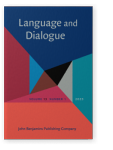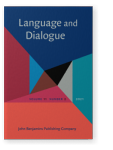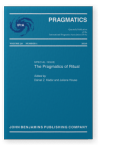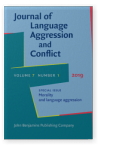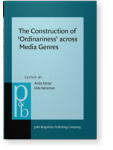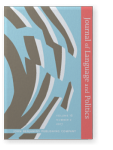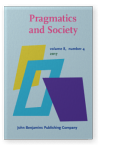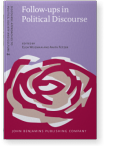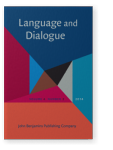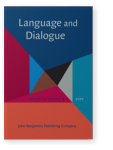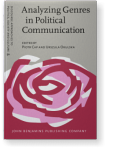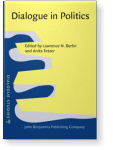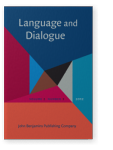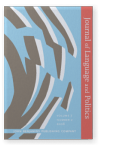Peter Bull
List of John Benjamins publications for which Peter Bull plays a role.
2023 Invitation to respond by rhetoric or delivery: A microanalysis of orator-audience turn-takings in a Subject-Object-Verb language Language and Dialogue 13:1, pp. 51–80 | Article
English (an SVO language) and Korean (an SOV language) are polar opposites in terms of grammatical order. Studies show that rhetorical devices (RDs) are effective in generating collective audience responses in British political oratory. This article attempts to study the functions of RDs in… read more
2021 Speaker’s verbal behavior and collective audience responses in Korean political oratory Language and Dialogue 11:2, pp. 271–299 | Article
An analysis was conducted of the discourse of South Korean political speakers in relation to collective audience responses, based on three situational contexts. Results showed marked contextual differences in the formatting of messages used to invite audience responses. In campaign speeches,… read more
2020 Calling Mr Speaker ‘Mr Speaker’: The strategic use of ritual references to the Speaker of the UK House of Commons The Pragmatics of Ritual, Kádár, Dániel Z. and Juliane House (eds.), pp. 64–87 | Article
Prime Minister’s Questions (PMQs) in the UK House of Commons is a ritual event, governed by a cluster of conventions. Members of Parliament (MPs) must address their remarks to the Prime Minister (PM) through the medium of the Speaker of the House, who is responsible for maintaining order during… read more
2019 “Let me now answer, very directly, Marie’s question”: The impact of quoting members of the public in Prime Minister’s Questions Morality and language aggression, Kádár, Dániel Z. and Vahid Parvaresh (eds.), pp. 56–78 | Article
Prime Minister’s Questions (PMQs) in the UK attracts much criticism for the adversarial and occasional aggressive language on display. During his successful campaign for the leadership of the Labour Party, Jeremy Corbyn called for a “new kind of politics” (ITV 2015). One feature of his “new”… read more
2019 Quoting ordinary people in Prime Minister’s Questions1 The Construction of ‘Ordinariness’ across Media Genres, Fetzer, Anita and Elda Weizman (eds.), pp. 73–101 | Chapter
Prime Minister’s Questions is the central British parliamentary institution. Every week Members of Parliament have the opportunity to pose questions to the Prime Minister, frequently utilising quotations from various sources, e.g. allies from the quoter’s political party, political opponents,… read more
2017 Failures in Leadership: How and Why Wishy-Washy Politicians Equivocate on Japanese Political Interviews Journal of Language and Politics 16:2, pp. 285–312 | Article
This paper examines how Japanese leading politicians deal with the communicative problems posed to them during broadcast political interviews. Based on data gathered during 14-month period in 2012–2013, the paper replicates and modifies the “Theory of Equivocation” to explore the extent to which… read more
2017 Order in disorder: Audience responses and political rhetoric in speeches from the second round of the 2012 French presidential election Pragmatics and Society 8:4, pp. 520–541 | Article
Recent research has established that Japanese political oratory and audience behaviour (Bull & Feldman 2011; Feldman & Bull 2012) are fundamentally different to those found in British political speeches (Heritage & Greatbatch 1986). To further develop these cross-cultural analyses of political… read more
2015 Follow-ups in broadcast political discourse: speeches, interviews, and parliamentary questions Follow-ups in Political Discourse: Explorations across contexts and discourse domains, Weizman, Elda and Anita Fetzer (eds.), pp. 3–24 | Article
The concept of the follow-up as the third element of a sequential triad was
originally formulated in the context of classroom discourse by Sinclair and
Coulthard (1975). In this chapter, it is applied to the analysis of three distinct
genres of political discourse: speeches, interviews, and… read more
2014 Telling it like it is or just telling a good story? Editing techniques in news coverage of the British parliamentary expenses scandal Language and Dialogue 4:2, pp. 213–233 | Article
According to recent research, there has been a marked shift in television new journalism from a fact-based to a more interpretive style, through editing techniques such as de-contextualization and re-contextualization. The aim of this study was to investigate whether such techniques might be… read more
2013 The role of adversarial discourse in political opposition: Prime Minister’s questions and the British phone-hacking scandal Language and Dialogue 3:2, pp. 254–272 | Article
The focus of this study is on the role played by adversarial questioning in political opposition. As an illustrative example, a detailed analysis is presented of two sessions of Prime Minister’s Questions in the UK House of Commons (6 and13 July, 2011), in which the Leader of the Opposition (Ed… read more
2013 Chapter 2. Political interviews in context Analyzing Genres in Political Communication: Theory and practice, Cap, Piotr and Urszula Okulska (eds.), pp. 73–99 | Article
The genre of the broadcast political interview is examined from a compositional methodological approach, drawing on ethnomethodological conversation analysis, critical discourse analysis, sociopragmatics, social psychology and media studies. A distinction is proposed between the default and… read more
2012 Watch dogs or guard dogs? Adversarial discourse in political journalism Dialogue in Politics, Berlin, Lawrence N. and Anita Fetzer (eds.), pp. 69–88 | Article
Research on interaction between political journalists and politicians is reviewed in three different contexts: broadcast interviews, press conferences, and news broadcasts. Substantive evidence strongly supports the view that journalists’ discursive techniques have become progressively more… read more
2012 Understanding audience affiliation in response to political speeches in Japan Language and Dialogue 2:3, pp. 375–397 | Article
Affiliative response invitations were analysed in 38 speeches delivered during the 2009 Japanese general election by 18 candidates for the House of Representatives (the lower house of the National Diet of Japan). The results clearly replicated those reported by Bull and Feldman (2011) in their… read more
2008 ‘Well, I answer it by simply inviting you to look at the evidence’: The strategic use of pronouns in political interviews Journal of Language and Politics 7:2, pp. 271–289 | Article
In the discourse of political interviews, references to participants can be expressed explicitly by proper nouns and forms of address, and they can be expressed implicitly by personal pronouns and other indexical expressions. The meaning of personal pronouns is context-dependent and retrievable… read more
